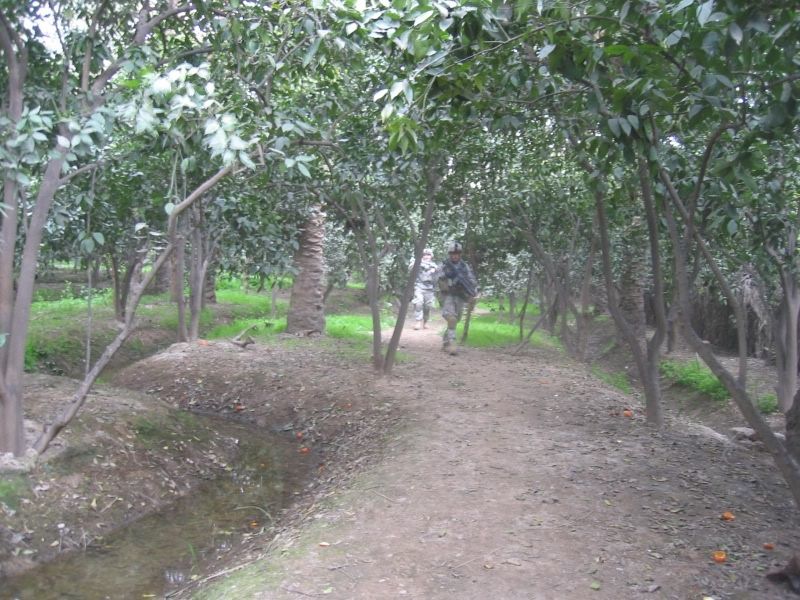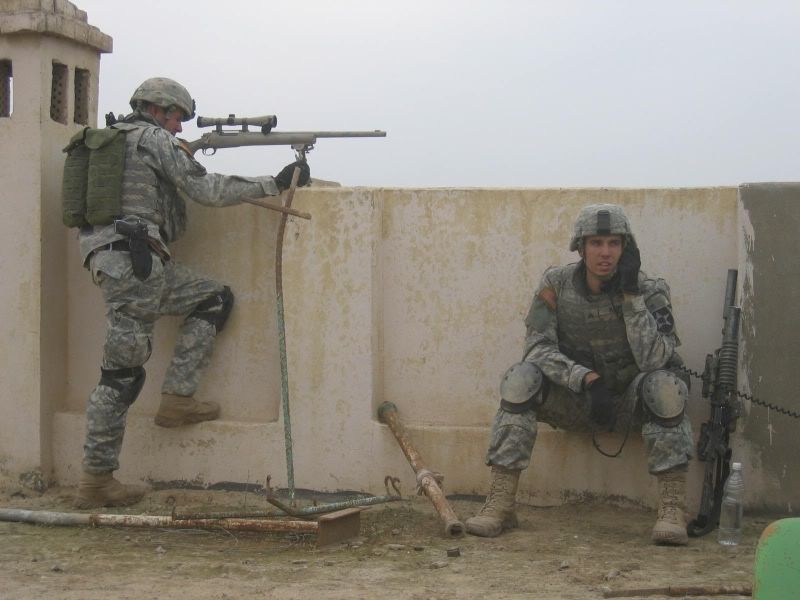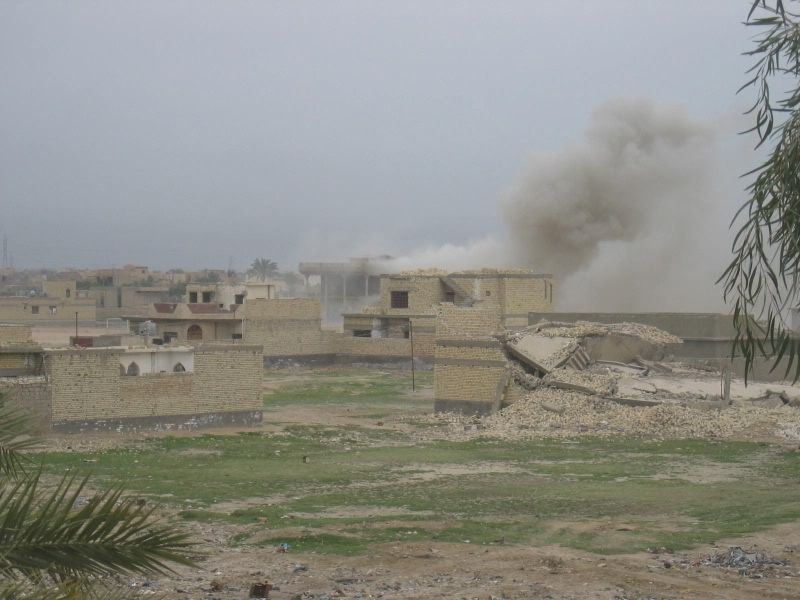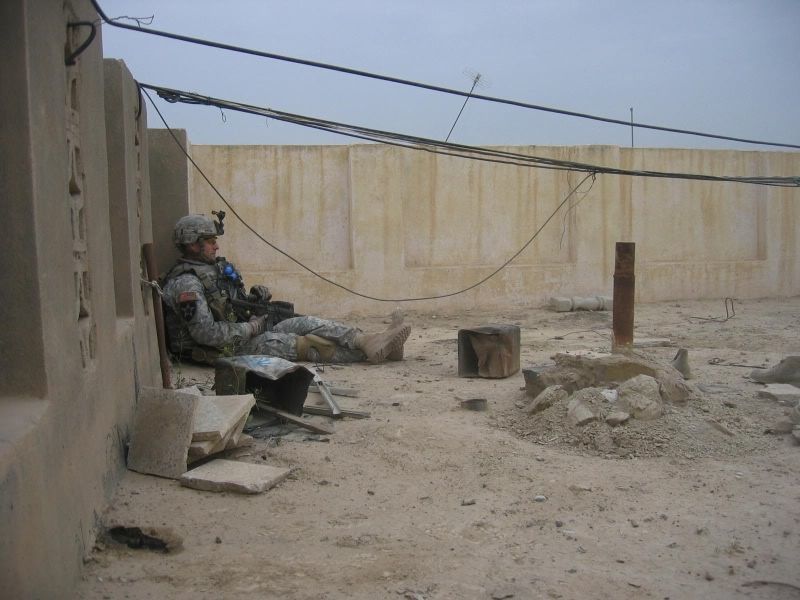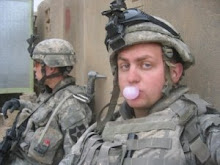With a clear conscience, Secretary Gates had us extended for three months. June 12 went from a daydream to the Tuesday between June 11 and June 13.
We set out in the early morning toward Chibernot, a small neighborhood in northern Baqubah bristling with mud huts and dense palms. We arrived a little past dawn and already felt the terrible strain of the weight we carried. Instead of driving on roads crammed with IEDs, we walked a good ways through the night, tripping in holes and stepping into streams tainted with septic waste. At one in particular, I heard the guy in front of me miss the jump across a tiny creek, sliding his foot deep into the mud. I put my night vision goggles up and leapt with all my might. With a thud I landed off-balance, my backpack pushing me forward almost onto my face. You know you're miserable when falling knee deep into diluted human shit is marginally worse than the morning you spent walking across open fields in the dark, twisting your ankle and reflecting on how your early 20s were working out.
At nearly seven in the morning we walked down a neighborhood street flanked by the occasional house. Someone spotted spent shell casings from an AK47 along the road. We spread out in the ruins of a destroyed building, looking for anything out of the ordinary. Walking along the wall, I noticed a groove cut out with bright splatters of blood covered on both sides and running down the back into the grass. It looked as if someone was bent over the groove and executed. A few more shell casings were cluttered next to the bricks.

Not a good day for some of us
After this find, we decided to look at the area more thoroughly. We headed for the one room cinderblock house across the street. Nothing seemed suspicious until Dozer began to kick around the dirt floor. Sending a cloud of rocks and soil into the air, he exposed a flap of buried plastic. He dropped down on his hands and knees and began to shovel dirt. We quickly realized it was a huge bag full of homemade explosives, a simple powder mix used to amplify air tanks and landmines in the deep-buried IEDs that had been destroying our Strykers with ease. More digging found another bag, at least twenty pounds. Then another. Then some landmines wired together to form a daisy chain explosion. Bags just kept on coming out of the ground. Binoculars. RPG sights. Grenade fuzes. Even more bags of homemade explosives. Hundreds of feet of wire. Batteries. AK magazines. Ammo boxes. A Motorola radio. An American 40mm grenade. Mortars. Dishwashing machine timers. Every insurgent weapon under the sun.

Showing off my organizational skills

From left to right: Cache gumshoe, a lot of boom, sweaty Dude
After destroying the stockpile we moved on, searching for others like it. We had with us a source from the 1920s Brigade, attempting to find Al Qaeda safehouses in the neighborhood. We stopped at a house while another cache was being sorted through and prepared for detonation. Slumping on the floor of the living room, we made jokes and laughed, waiting for the explosion to rock the house. I was sitting to the left of the window with four or five people in between. We got the call: one minute until controlled detonation, everyone inside. We put our fingers in our ears. 30 seconds. 10. 5. Then, BOOM! A sliver of glass burst from the window, taking a magic bullet route past the other dudes, completely missing my right arm and striking me in the left wrist. Once I saw blood I said with a laugh, "Man, I'm fucked up!" My medic gave me a routine bandage after I dripped a bit of blood onto the ground. I pointed to the red spots on the floor in the house and said "sorry" to the owner of the house, with a shrug of my shoulders. While we waited for the extraction plan, I sat down and watched the 1920s dude pore over the documents belonging to the people in the house. They weren't supposed to carry weapons, but if we don't arm Sunni insurgents, who will?

Not pictured: Bloody wound
After more than ten hours on the scene, we decided to skedaddle. We were told the trucks were closer than the drop off point, a relief after walking all day in the June desert heat. Helicopters buzzed above us as we snaked through the outskirts of the town.
The heat proved to be a formidable enemy and we had to halt in a house for a moment. I finished the last drops of water and tossed my bottle into a garbage pile. Walking into the courtyard I quickly found a few friends gathered around a car in the shade. We talked about how far the Strykers were in actuality. The Apaches continued to fly low above us, close enough to see the pilots and their hand gestures. Several people came to the same conclusion at the same time: we have to moon them.
In a straight line in the yard, the guys dropped their pants with their asses facing the approaching helicopter, waving and hollering. The pilots waved back and shot flares up into the air in acknowledgment.

Fun in combat is a fleeting moment, and quickly the mooners buttoned their pants to continue on the path, about to trade a summer breeze grazing their asses for a hard Stryker bench. After walking nearly a mile down the road, we heard the distinct whine of the trucks. Getting in, sweaty, dirty, dehydrated and exhausted, we did some good by taking bomb making material off the streets. But for what was supposed to be a special day, it ended like the hundreds before and after it: speeding toward our base, our enemies watching our every move.
AH











